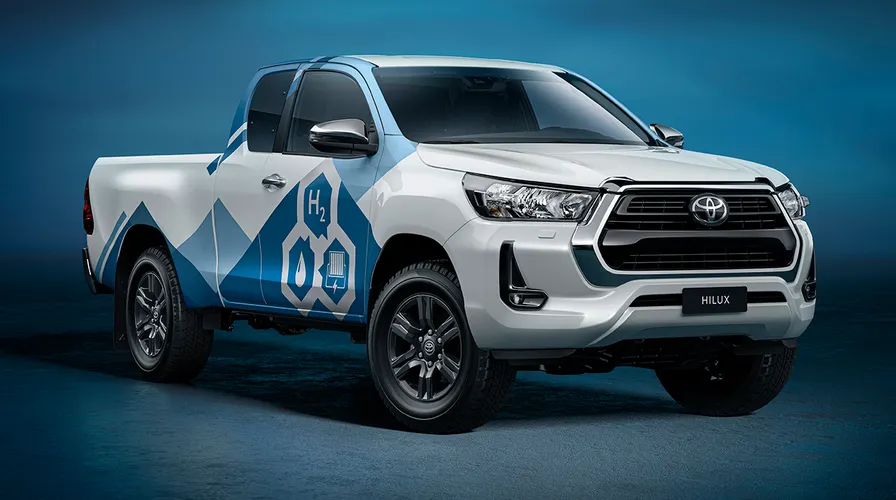Toyota reveals a hydrogen-powered pickup truck and SUV

Hydrogen is a big part of Toyota. The Japanese automaker is developing vehicles with fuel on multiple fronts because it sees a bright future for it as an alternative to battery power in the zero-emissions automotive world of the future.
It offers the Mirai in the state, which is the only one with anything resembling a public refueling network, in addition to the fuel cell-powered semi trucks it is currently testing in California.
Through a chemical reaction, stored hydrogen and oxygen from the air are combined in a fuel cell to generate electricity. Compared to a battery pack, the system is lighter and can be refueled much more quickly.
The 182 horsepower powertrain of the Mirai has been converted into a pickup for testing by Toyota’s UK division. It is utilizing a Hilux, a truck that is available outside of the United States and is comparable in size to the Tacoma.
Since a driveshaft is no longer required, the fuel cell is mounted under the hood and three hydrogen tanks are below the cabin. The rear wheels are powered by just one electric motor.
Additionally, Toyota is investigating the straightforward combustion of hydrogen in an internal combustion engine that produces water vapor as opposed to carbon dioxide.
It has installed a high-pressure hydrogen injector-equipped 268 horsepower 1.6-liter three-cylinder turbocharged engine from the GR Corolla sports car into a Corolla Cross subcompact SUV for testing in Japan.
Toyota claims that it produces roughly the same amount of power as a gasoline-powered vehicle, and a refueling system has been developed to reduce the amount of time required to fill the tank from five minutes to one and a half.
For the 2024 model year, rival Honda has announced that it will offer a hydrogen fuel cell version of the CR-V SUV in the United States.
Toyota has not announced any production plans, but the company is working on something even more exciting.
It is working with Yamaha on a 5.0-liter V8 engine that burns hydrogen. This engine could be used in full-size trucks and sports cars.
“Everyone who came to test-drive the prototype car would start off somewhat skeptical, but emerged from the car with a big smile on their face at the end,” team member Takeshi Yamada said. “As I watched this, I started to believe that there is actually enormous potential in the characteristics unique to hydrogen engines instead of simply treating it as a substitute for gasoline.”